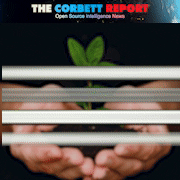Podcast: Play in new window | Download | Embed
by James Corbett
BoilingFrogsPost.com
February 25, 2014
You would have to have been living under a rock to have missed the rollout of so-called “smart” technologies in recent years, but for those unfortunate rock dwellers who have somehow avoided the “smart” propaganda, there is no shortage of flashy, cartoonish PR puff pieces that are willing to sell it to you.
Although these bubbly, feel-good, lowest common denominator commercials leave the viewer with the warm fuzzies, they do little to explain what this so-called “smart” technology actually is. Stripped of all the hype and sweaty-palmed hyperbole of the massive PR campaign surrounding it, the only thing that “smart” really means is that a given piece of technology can be linked up to a network to send and receive information.
The real question, of course, is why we supposedly need every gadget and appliance in our home, from our toaster to our thermostat, to be networked at all. Like all such questions, there are two answers: the cover story and the true story.
The cover story is that networking these technologies will allow us to reduce the amount of power that we consume and, as an added bonus, save us money on our monthly power bill.
What’s more, the linking of all of these appliances into one seamless personal network—the cover story assures us—will finally allow for the Jetsons-like future that has been promised us for decades.
Those with properly functioning bull excrement detectors might question whether the embedding of RFIDs and processors in our fridges and coffeemakers and egg timers is really all about saving a few Watts of electricity or the hassle of pressing a few buttons. This is where the true story of smart technology comes in.
Smart technology represents less of a breakthrough in power distribution and more of a revolution in complete, constant, panopticon-like surveillance of everyone. As these smart technologies begin to invade our homes, we are becoming mere nodes in a giant network that we yet but dimly comprehend. Called the “Internet of Things,” the plan is to create a network that will eventually include every single object on the planet. And as the public is finally becoming aware, such networks provide golden opportunities for corporations and governments alike to collect data and spy on the population.
This is not mere conjecture. Before becoming enmeshed in an affair that ultimately derailed his career, former CIA director David Petraeus bragged openly about how these smart technologies would allow intelligence agencies to spy on everyone in their own homes, using their own appliances. Speaking at a summit for In-Q-Tel, the CIA’s venture capital firm, Petraeus noted: “Items of interest will be located, identified, monitored, and remotely controlled through technologies such as radio-frequency identification, sensor networks, tiny embedded servers, and energy harvesters.[…]In practice, these technologies could lead to rapid integration of data from closed societies and provide near-continuous, persistent monitoring of virtually anywhere we choose.”
Whether Petraeus’ own downfall as a result of FBI eavesdropping on private emails is part of a plan to warn future would-be whistleblowers, poetic justice, or mere irony, it is nonetheless instructive. When everything that anyone does is tracked, traced and databased at all times, from our dishwasher usage to our television viewing to our toilet flushes, no one will be able to avoid the gaze of the state, regardless of whether or not they have “something to hide.”
As ITWorld’s Kevin Fogarty observed, if J. Edgar Hoover were alive he would die of jealousy at the technologies available to the would-be Big Brothers of today.
As nightmarish as this seems, the possibilities for tyrannical misappropriation of this technology are even worse. Given that networked appliances allow for remote access, smart technology actually raises the specter that governments and corporations will be able to control the items in your own home.
Here again, as much as this sounds like Buck Rogers fantasy or Orwellian nightmare, it is in fact mundane reality. As far back as 2008, California lawmakers were already tabling legislation that would mandate the installation of smart technologies and allow governmental bodies to automatically adjust homeowners’ thermostats up or down to conserve energy at peak usage times. The stark truth is that any appliance can be turned on or off, adjusted, or otherwise manipulated by anyone with access to the network remotely, including your own car.
Most worrying of all, whether or not we want to use these technologies, the average person is being left with little choice. More and more of the appliances and household goods we use have these technologies embedded by default, and now, thanks to the so-called “smart” meters that are increasingly being installed in people’s homes without their knowledge or consent, that choice is being removed entirely.
Thankfully, the situation is not hopeless. As Josh Del Sol, the filmmaker behind Take Back Your Power notes, there are specific steps that people can take to stop smart meters being installed in their homes, and that communities can take to stop them being installed at all.
Make no mistake, the fight against “smart” technologies is going to be an uphill one. For a population that understands little outside of the realm of bread and circus entertainment, explaining why anything with the word “smart” in front of it may be a bad thing will be challenge enough. But hopefully, as films like Take Back Your Power and other exposes begin to gain traction with the public, we can expose this “smart” technology for the stupidity that it is.








0 Comments